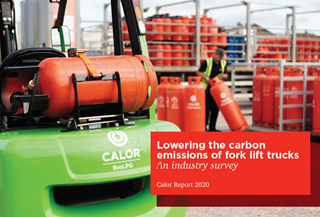Survey reveals ‘more can be done’ by materials handling industry to quash carbon footprint

The report – Lowering the carbon emissions of fork lift trucks – available now to download on Calor’s website, has also highlighted that whilst renewable energy sources are set to take over from fossil fuel to generate electricity for the UK’s grid, the adoption of electric FLT fleets to handle materials is highly dependent on a business’s location and its operations. What’s more, respondents reported negative impacts on production, with 64% saying they have to reduce outputs at certain times of the day, or alter production/work schedules to fit around charging times.
Although new FLT technologies and greener fuels are continually being developed and coming onto the market, financial incentives for using these solutions would be welcomed by many. This view is backed by 30% of the industry who said in the survey that businesses should receive tax breaks if they can demonstrate annual carbon reduction achievements. Similarly, businesses who fail to achieve carbon reduction targets could have penalties imposed upon them, to form a “carrot and stick” approach. Nearly a third (31%) of those surveyed were in support of this.
David Goss, Technical Manager of the British Industrial Truck Association says, “Since the Government set the target to achieve net zero carbon emissions by 2050, how FLTs can move towards a greener, carbon-neutral future is becoming a bigger part of the conversation about how the materials handling industry can operate more sustainably. Acting as an enabler for future discussions, BITA welcomes this report as a helpful addition to an important ongoing debate that is critical for the future of the FLT industry.”
Steve Donaldson, National Accounts Manager at Calor, says, “Organisations that are scrutinising their whole value-added network are increasingly looking at how they and their suppliers can operate more sustainably. For materials handling operations, not only does this mean looking at lowering emissions of road transport, but also off-road machinery such as fork lift trucks.
“Reducing carbon footprint whilst remaining cost-effective and operationally efficient in such a competitive sector is no easy task. That’s why we wanted to better understand the issues involved, share the barriers to change and reveal the experiences and thoughts of FLT end users across a broad spectrum of industries. These insights would enable the materials handling industry to have more meaningful conversations about how to adopt low-carbon technologies and fuels for FLTs more widely, in ways which would satisfy commercial, economic, operational and environmental demands.”
To read the full report, please visit: https://www.calor.co.uk/fltreport
1 The survey, conducted by Censuswide, interviewed 101 randomly-selected decision-makers and managers who are responsible for purchasing forklift trucks and their fuel, across the UK, in October 2019. Participants worked in various sectors including logistics and warehousing, retail, manufacturing and healthcare, and the sizes of their companies ranged from firms with less than 50 employees to those with over 500.